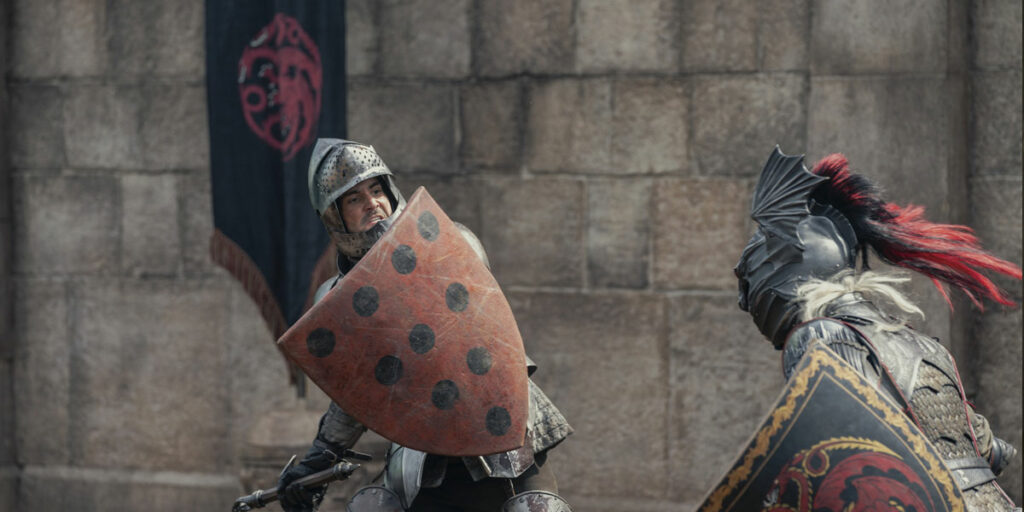Westeros is back with style in episode 1 of HBO’s House of the Dragon, as it reclaims its throne in the TV space with promising smart writing, characters and an epic scale.
Leading up to episode 1 of House of the Dragon, “The Heirs of the Dragon,” George R.R. Martin expressed how “out of the loop” he felt during the development of the later seasons of Game of Thrones. It is not too shocking to hear this, though, as any book reader can identify when exactly the series stopped following Martin’s novels and started doing its own thing. Seasons 1 through 4 — the ones Martin was the most involved in — are as faithful adaptations as you can get, while you can argue seasons 5 through 8 are incredibly messy because of Martin’s absence. HBO executives took notice of this and brought George back to help pick the successor show to Game of Thrones. Martin handpicked Ryan Condal, a self-proclaimed massive fan of Martin’s books, to write a treatment for two spin-offs. The first one was an adaptation of George’s Dunk and Egg novellas, the other on the Targaryen civil war known as the Dance of the Dragons. Condal’s second pitch eventually won, as it got a straight to series order by the premium cable network. Miguel Sapochnik — famous for directing some of Game of Thrones’ most popular episodes — joined the project as a co-showrunner, alongside Condal, to help bring to life what we now know as House of the Dragon.
Spoilers ahead.
Based on George R.R. Martin’s “Fire & Blood,” House of the Dragon takes place 172 years prior to the birth of Daenerys Targaryen (Emilia Clarke) — as it’s described in a title card that pays tribute to the iconic character from the original series — and follows the noble family of House Targaryen during the height of their power. The series’ pilot opens with The Great Council of 101, where King Jaehaerys I Targaryen (Michael Carter, The Illusionist) assembles the lords of the realm at the ruins of Harrenhal to help him choose a successor to the Iron Throne after the death of his sons. The Old King’s eyes turn to his grandchildren, Viserys (Paddy Considine, Wolf) and Rhaenys Targaryen (Eve Best, Fate: The Winx Saga). Both cousins — although there were up to fourteen other claimants — are the primary candidates for the position. Viserys would prove to be the favorite by the lords, earning him the right title to become the next King of the Seven Kingdoms after his grandfather’s passing.
Episode 1 of House of the Dragon does not waste a single second to establish the time period that the spin-off show takes place in, nor to set up the main conflict at hand. The prologue makes a point to demonstrate that, no matter how fit a woman might be to sit on the Iron Throne, the lords will rather turn down a qualified candidate in favor of a male, which will come to play later in the episode. As the narration by Emma D’Arcy (Truth Seekers) — who will play the older version of Rhaenyra down the line — foreshadows, The Great Council’s attempt to prevent a war by naming an heir will prove to have been in vain, as their decision would play a role in the Dance of the Dragons. Only House Targaryen could bring upon their own demise, as we will see in this story.
THE DRAGON FAMILY
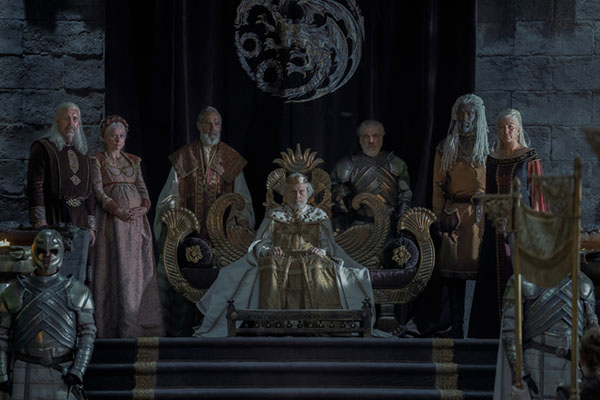
Once we get past the prologue it’s when we really get to dive into our new roster of characters. There’s Rhaenyra Targaryen (Milly Alcock, Upright), first born child to King Viserys I, who seems to have a rebellious personality and is extremely passionate about her bond with her dragon Syrax. Alcock radiates so much charisma — only comparable to what Maisie Williams brought to Arya Stark — that she effortlessly makes the audience fall in love with her portrayal of the character. Her chemistry with Considine is sweet as well, though you can spot a level of tragedy in their relationship as Viserys is constantly trying to produce a male heir. Because of this, Rhaenyra often feels like she’s on the sidelines, even if her father still loves her and has good intentions for his family.
Like in Game of Thrones, the decision to age-up some of the younger characters in House of the Dragon ends up in a much stronger emotional punch. From a storytelling point of view, having Rhaenyra be named the heir to the Iron Throne when she’s a teenager is way more impactful here because of the tricky relationship there is between father and daughter. Once she’s recognized by her father as his successor to become Queen, there’s a rewarding feeling both Rhaenyra and the audience share as a result of this, which can’t be said about what happens in the novel since she’s five year-old when she’s named the heir. This choice also benefits Rhaenyra’s arc, as it gives her the opportunity to develop strong bonds with other characters, including her own mother. It also explores the idea of the gender inequality that there is in Westeros when people start opposing Rhaenyra’s claim simply because she’s a girl.
A character I wasn’t expecting much from is Queen Aemma Arryn (Sian Brooke, Good Omens), wife to King Viserys I and mother of Rhaenyra. The characterization of Aemma in“Fire & Blood” is very limited. Her role is reduced to a few lines describing who she was, how she tried to give Viserys male heirs, despite suffering several miscarriages, and then talking about her death. House of the Dragon, on the other hand, is a TV show and needs its audience to care, so it does attempt to make her a whole realized character, even if we only get to spend time with her for just the pilot episode. Brooke brings a lovable tenderness that only a mother or a caring wife could give, which we see during her brief encounters with Rhaenyra and Viseys. She doesn’t have much screen time, but Brooke goes up and beyond to make you care for Aemma, especially when she eventually meets her end giving birth to her last stillborn son. After three years of not being able to visit Westeros since the original series’ ending, you kind of forget just how violent this world can be. Aemma’s death is painful to watch not only because it is extremely graphic, but because of what it means for her loved ones. This sequence might make Viserys an easy character to hate for some viewers as he puts his obsession of having a son above the life of his own wife, making for great real-world commentary regarding women’s rights being challenged in regards to do with their bodies as they please.
There are many benefits of adapting a book like “Fire & Blood” — an in-universe history book written with the help of unreliable narrators — but the biggest advantage the show has is probably being able to shed light to the actions of our characters. Viserys is a great example of this, as he is described on the page as nothing but a peaceful man who hated conflict and was pleasant to be around. Although some of these qualities remain the same in HBO’s adaptation, he is way more layered on the screen. His constant struggle of trying to keep everyone in his court happy is relatable from a human perspective, but you also can’t help but be frustrated by his actions. As a King, he needs to make those tough decisions nobody else can, yet he refuses to. It’s only natural that the two times he finally decides to act as a King his decisions end in tragedy: Queen Aemma dying during childbirth because Viserys viewed his unborn son more important to the realm than his wife, and making Rhaenyra heir to the throne, which will lead to a civil war. Paddy Considine is seemingly going for an Emmy, already delivering one of the standout performances of the show.
THE ROGUE PRINCE
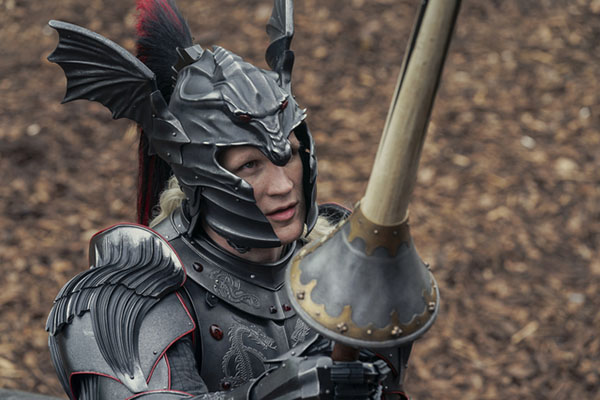
Let’s talk about the man of the hour. The one casting choice that was the most controversial when announced: Matt Smith’s (Morbius) Daemon Targaryen. Also known as The Rogue Prince, he is the younger brother of Viserys and uncle to Rhaenyra. Most fans called the actor “too ulgy” to be a Targaryen, let alone the legendary Daemon. If the pilot episode is proof of anything, it is that people should really wait until they see the finished product before making rude comments or criticizing a performer. He is Daemon Targaryen. Smith embodies both the light and darkness in The Rogue Prince and you can tell he is having so much fun in the role. Through his performance, you can tell this is a guy who could have killed his brother a long time ago if he really wanted to take the throne for himself, as people like to believe he would. He hasn’t, though, because he’s not a complete monster. Daemon loves his brother, he loves this family, in his own complicated way, while also having his own ambitions. The sequence where he is commanding the City Watch to punish the criminals of King’s Landing is brutal and shows how relentless he can be when given a position with any sort of power.
THE HIGHTOWERS
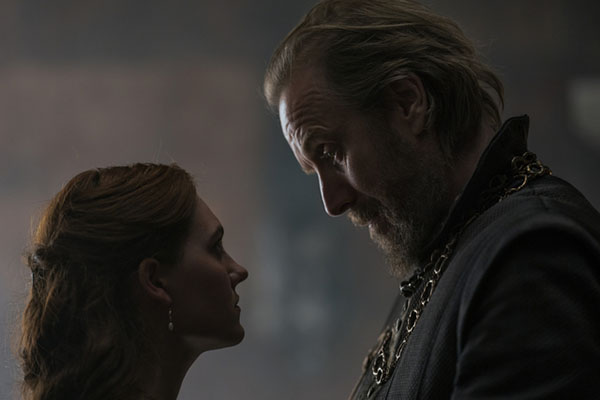
To touch on the politics of this era, I could not think of a better person to fit the role of the expert manipulator than Rhys Ifans (The King’s Man) as Otto Hightower. You could very easily compare him to Tywin Lannister (Charles Dance) from Game of Thrones, but somehow Ifans is way more creepy to watch. This particularly comes to light when we see the kind of relationship he has with his daughter Alicent (Emily Carey, Wonder Woman). As soon as Queen Aemma, whom Alicent seems to have a healthy relationship with, is gone, Otto sees this as an opportunity to grow his political ambitions.
Otto sends Alicent to comfort Viserys in his chambers, creating an odd situation for both parties. Emily Carey really does her best to make Alicent a sympathetic character. Like Rhaenyra, she’s often blamed for the wars that are yet to come in the book, when in reality she’s just another victim of the game. And having a strong friendship between Rhaenyra and Alicent will only make things more difficult for both later on, something we don’t have in “Fire & Blood” to connect these female characters on an emotional level.
THE SEA SNAKE
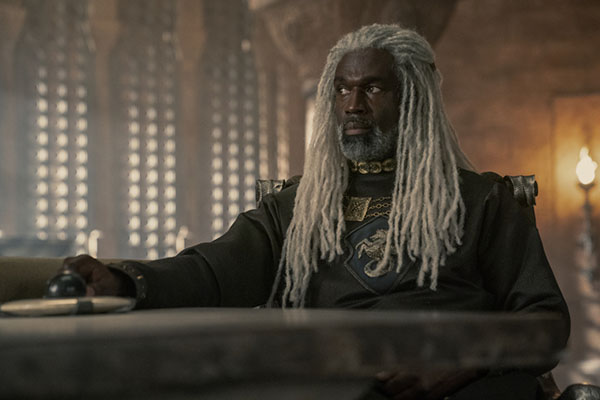
Recently, it seems like every major franchise can’t catch a break from being accused of being “woke” or trying to force diversity into their stories. What’s ironic about this type of comment is that our world itself is large and diverse, which makes their argument completely invalid because these storytellers are only trying to reflect such a diverse group of individuals on the screen. Why am I bringing this up? Well, because Steve Toussaint unfortunately had to go through this kind of hate after being cast as Lord Corlys Velaryon, nicknamed The Sea Snake.
Like the hatred Matt Smith received when his casting was publicly announced — though it was certainly more severe for Toussaint — fans lost their minds because they couldn’t accept that Westeros was about to portray the character as a Black man, despite Corlys being white in the books. As it’s been proven time and time again in the past, the color of an actor’s skin does not determine talent and Toussaint absolutely dominates the screen whenever he is present. Anytime he utters a word during the council meetings you want to keep yourself from talking in order to pay attention to his brilliant performance. Him and Eve Best are great together in the few moments we spend with them, but if those scenes are indication of anything it is that these characters are in good hands.
THE WARS TO COME
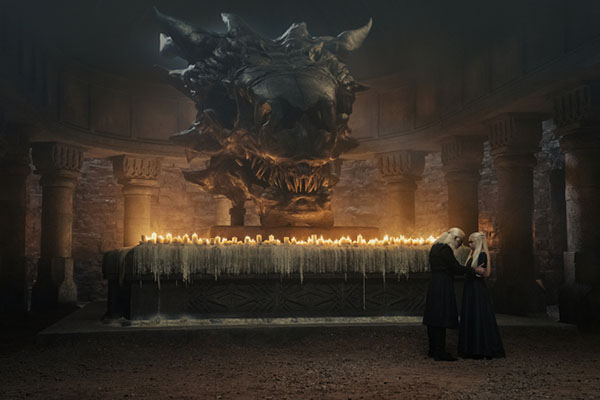
Miguel Sapochnik as a director never fails to astonish. Even when the writing wasn’t fully there in Game of Thrones, he would always find a way to engage you one way or another with the storytelling on the screen. His eye for visuals is on the level of what you would see in a big budget blockbuster, if not better. The way the dragons and the huge castle structures are framed gives a great sense of scale that can only be compared at times to something from the likes of The Lord of the Rings or Denis Villenueve’s Dune. Don’t get me wrong, the original series shared a similar epic scale, but House of the Dragon just feels different. From the props to the costumes, sets, and the atmosphere that the cinematography creates, everything feels much more vibrant. The tourney that is thrown in the name of Viserys’ unborn son captures all of these elements working together so perfectly. I think the editing choice to cut back and forth between the fighting at the tourney and Aemma giving birth was a great thematic decision to showcase how violence works in Martin’s world. Men fight one another to please the King and the realm, while women battle for their lives in childbirth because they can’t be seen as nothing else beyond producing future Kings or Queens to their husbands.
Lastly, before I say my farewells until next week, we have to talk about the elephant in the room: the reveal that Viserys has been hiding a secret that has been long passed down from King to heir. That secret, of course, is the fact that Aegon the Conqueror chose to unite the Seven Kingdoms not only for ambition, but because he had a prophetic dream of the end of the world. If you’re a Game of Thrones fan or an “A Song of Ice and Fire” aficionado, then you’ll know this is referring to the White Walker problem our characters are faced to deal with in the original series. With this in mind, you get the sense that each King since Aegon the Conqueror has probably thought they would be the ones forced to have to deal with this threat in the far North. The Targaryen Kings were right about their fear, but they were off by almost 300 years. That’s the beauty about prophecies in Martin’s world. They’re not necessarily wrong, but the people reading them could misinterpret them.
I can already see the controversy this will cause across the fandom on social media. People arguing what’s the point of this if Daenerys dies in Game of Thrones’ final season as a villain, not a prophetic hero as it’s being potentially foreshadowed here. What I will say about this is that I’m sure this Aegon dream came from George himself, so if you don’t like how it went about in season 8 of Game of Thrones, then you can still take it as a way for Martin to foreshadow his own endgame in the books through this show.
There’s really not much to get mad about: it’s actually really cool for those fans of the show or the books, or both. You pick what you like and run with it. Obviously, there is so much more to cover that I am sure will be developed into proper drama in later episodes. Ser Criston Cole (Fabien Frankel, The Serpent) is an ongoing thread that will have a significant part to play in future events, he isn’t a one-time character who comes in one episode to play the noble Knight. He is presented as a competent fighter as he is able to win against Daemon during the tourney, potentially winning Rhaenyra’s attention in the process. We also have the threat of the Triarchy, which Corlys mentions early in the episode as a dangerous opponent to both Westeros and Essos. So much to unpack, so much to discuss in the next ten weeks we will have with House Targaryen. One thing is certain, though, Westeros is back and it is here to stay. Anybody who tries to take its place as the TV phenomenon that this franchise has become will be met with fire and blood.
Episode 1 of House of the Dragon is now available to watch on HBO Max.

